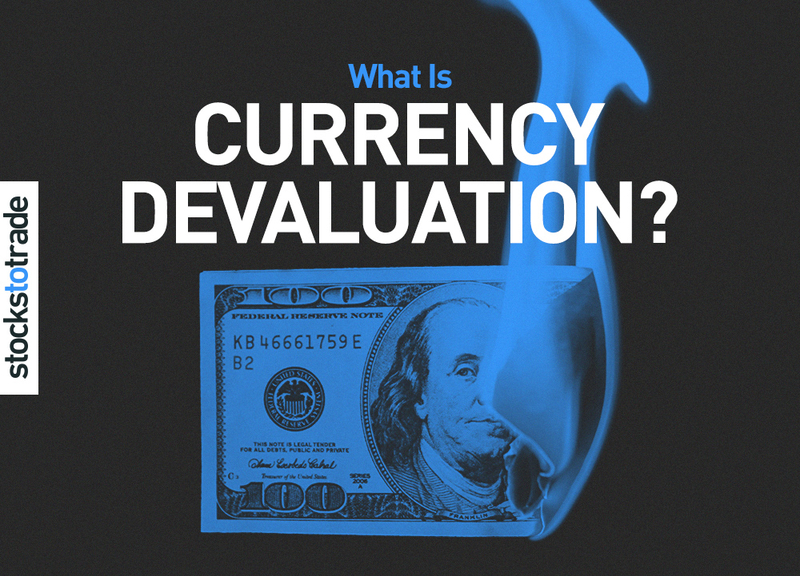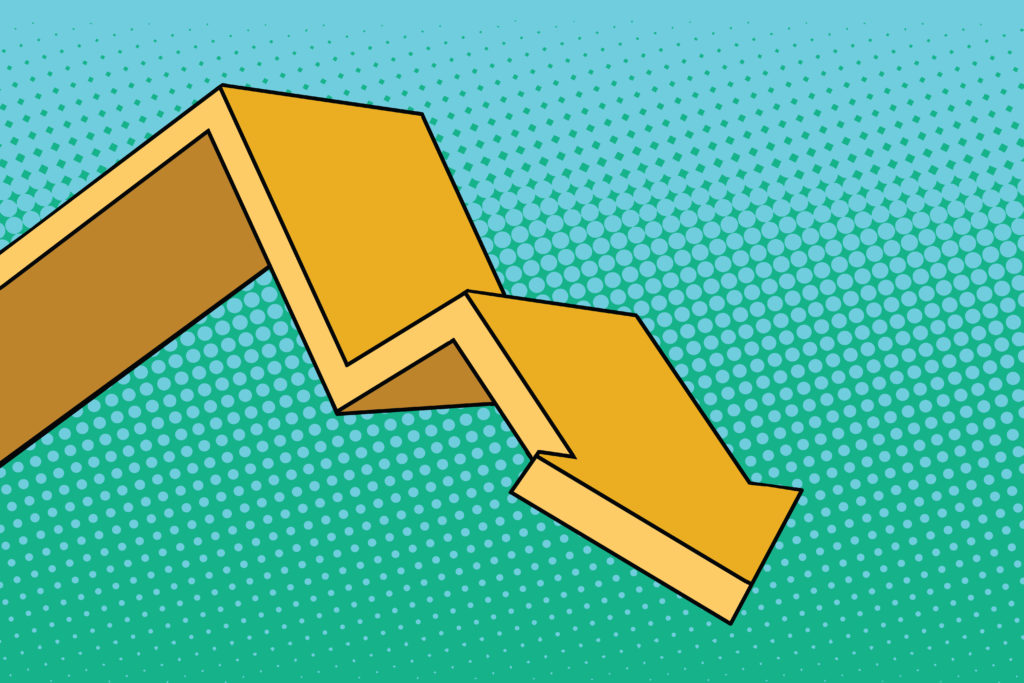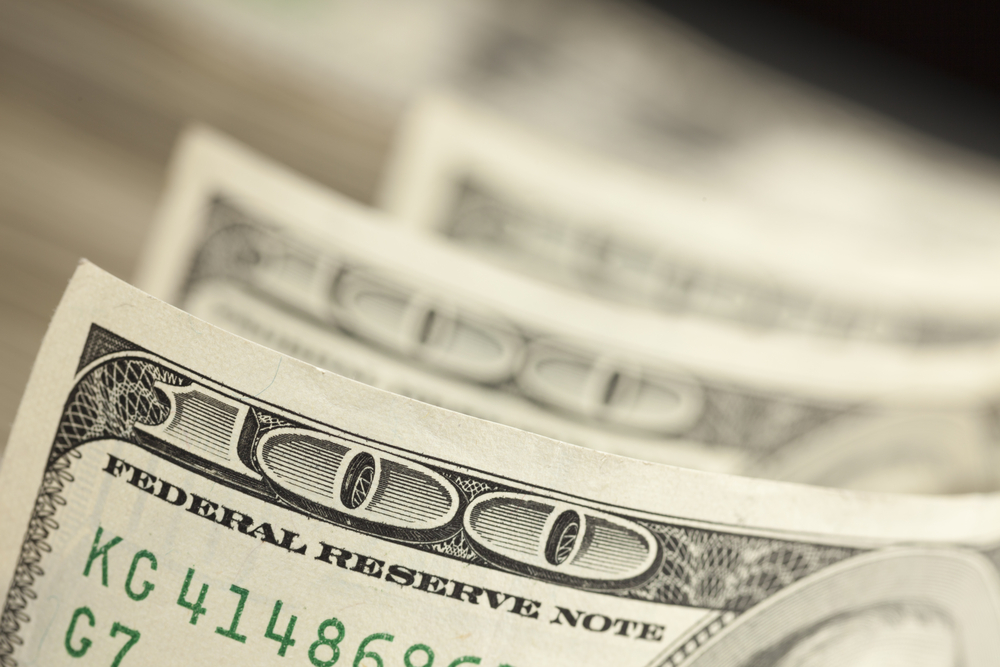Many traders and investors fail to look at currency devaluation when choosing stocks to trade.
So what does this fancy term mean, and what the heck does it have to do with your trading?
First, let’s get some context. The ongoing trade war between the U.S. and China is sending ripples through the stock market. It’s like a rollercoaster these days.
And this is on a global scale and, of course, involves currency. So it’s important to take the time to understand devaluation and how it can affect you as a trader. Now, let’s get into the dirty details…
Table of Contents
What Is Currency Devaluation?
Currency devaluation happens when a country’s government and central bank leaders make an intentional decision to decrease its currency’s exchange rate — its value.
Now, don’t confuse currency devaluation with depreciation. That’s a more organic event that isn’t deliberately engineered by a small group of country officials.
Here’s an example how it works: Let’s say I’m a California winemaker, and Italians love my wine. On Friday, one euro was worth $5. I charge $100 for a bottle of my best cabernet sauvignon. So on that day, one bottle of my wine costs Italians $20 (100 divided by 5).
Then on Monday, the Federal Reserve devalues the dollar. At the new exchange rate, one bottle costs $10 (100 divided by 10). I sell more wine and other American businesses sell more goods because they’re cheaper in terms of dollars. And guess what? Exports increase.
Italian goods (and products from any country using the euro) are now more expensive for Americans, so imports decrease.
Examples of Currency Devaluation
History is littered with cringe-worthy cases of currency devaluation.
At the end of 1994, newly elected Mexican president Ernesto Zedillo announced the Mexican central bank would drop the peso’s value between 13%–15%. The trouble was, one of his campaign promises was “no devaluation.”
It was a bad move that delivered a one-two punch squarely in the Mexican economy’s face.
First, Zedillo lost massive credibility with Mexican investors, who also feared more devaluation. (Think George Bush Sr. telling the American public to “read my lips, no new taxes,” then raising them anyway.)
Second, the ensuing flight of Mexican money to foreign investments drove interest rates up.
The knock-out blow came from foreign investors. They saw the chaos and ran for the exits, dumping their shares as fast as possible. That sent the Mexican Stock Exchange to the mat.
In an attempt to staunch the flow of assets out of the country, the central bank raised interest rates. But it was another ill-advised gambit — higher borrowing costs hampered economic growth.
Brazil and Venezuela are two other countries notorious for devaluing their currency, then struggling to recover from the aftermath.
China Currency Devaluation
The U.S. and China have been exchanging jabs over trade for a while now. Trump is trying to make good on his “America First” campaign promise. He’s repeatedly accused the Chinese of unfair trade practices and currency devaluation.
It’s been tit for tat, with each country imposing or threatening to impose heavy tariffs on each other’s goods.
Tensions escalated yet again when the Trump administration slapped tariffs of 10% on $300 billion worth of Chinese imported goods. Shortly after on August 5, the Chinese central bank set the yuan below 7 per dollar for the first time in almost 11 years.
Global markets plunged, and the Dow lost almost 3% in a single day … the worst performance in 2019 to date. Some economists say this trade war is the leading cause of the slowdown of economic growth around the globe.
Unfortunately, it seems an agreement may be far off. Why? Neither Trump nor Chinese President Xi Jinping is likely to push an accord that would end the disputes. Neither wants to be seen as weak or caving to the other side.
What Is Currency Devaluation?
There are three main reasons a country will devalue its currency:
- Increase exports
- Lower the trade deficit
- Ease sovereign debt burden
According to the International Monetary Fund (IMF), depreciating a currency by 10% improves a country’s trade balance by around 0.3% of gross domestic product (GDP) in the space of a year. Across a three-year period, the devaluing country reaps a 1.2% gain.
Currency devaluation isn’t always a bad thing, and plenty of countries have done it. Devaluation is a strategic tool that — used sparingly — can be useful.
Why Devaluation Is Bad
But in too many cases, devaluation turns sour.
Does the real value of your stocks go down in the event of devaluation? If you own the stock in the devalued currency, it might.
The stock could bounce back in the long run … That’s if investors believe the company’s value will rise in relation to the devaluation. And if they have confidence in the market.
But overall, devaluation can give investors a general scare about anything and everything, even if a company’s value is solid.
Currency Wars and Devaluation
Countries may actively devalue their currency to make it more expensive for foreign exporters to sell goods and services to their consumers. But these countries risk incurring the wrath of their trading partner countries.
In some cases, a country crosses the line from devaluation to manipulation and a currency war can ensue.
In the case of the U.S., the Department of the Treasury might cry foul and call manipulation given three conditions:
- The country is a net lender to the rest of the world (account surplus).
- The country is a net exporter relative to the U.S. (trade surplus).
- There’s clear evidence the country is leveraging its currency “for gaining unfair competitive advantage in international trade.”
At that point, the treasury secretary works to negotiate a solution through direct discussions, the IMF, or bilateral discussions.
But in the practical world, being tagged as a currency manipulator is largely an exercise in high-level name-calling. The accused manipulator has a year to fix its transgressions before it’s penalized in any way. And it almost always does to avoid the penalties.
But not all currency devaluation is currency manipulation. The difference comes down to how active a government is in creating movement in the value of its currency.
The winners in currency devaluation are usually:
- Exporters
- Workers in export industries (job creation and wage increases)
- Internal tourism industry
The losers are generally:
- Consumers who buy imports
- Businesses that sell imports (prices must go up, which can squash revenues)
- Locals who want to vacation outside the country
- People living on fixed incomes
Currency Devaluation in 2019
While the Chinese yuan devaluation is front and center on the world stage right now, it’s not the only place devaluation is wreaking havoc on economies.
Zimbabwe is carrying about $9 billion in debt to international creditors it can’t pay. Its citizens are living under austerity measures imposed by the IMF and the World Bank. The country can’t get any other institutions to extend further credit until arrears are made current…
So its central bank went ahead with a currency devaluation earlier this year. And it spelled a drastic 90% drop in wage values.
While the finance minister is busy declaring victory in the war on debt, citizens are protesting in the streets of Harare, the nation’s capital. At times, the police are using violence to end the otherwise peaceable demonstrations, with no light visible at the end of the tunnel.
The Bottom Line
Currency devaluation is often a double-edged sword. It can restore a country’s economic competitiveness in world markets. But it can also create new problems like inflation.
Smart traders will pay attention to devaluation events and closely monitor any stocks affected…
Devaluation isn’t an automatic cause for alarm or sell-off. But it’s wise to keep an eye on long-term forecasts for an economy with devalued currency. It can be essential to preventing unnecessary losses.
StocksToTrade
Need a great way to monitor stocks? You’re in the right place. Try StocksToTrade — a trading platform designed by traders for traders. Our stock screener tools can help you with your stock research and stay current with the market.
You’ll get access to market news, indicators, quotes, charts, and much more.
And if you want to access a community of other like-minded traders, try StocksToTrade Pro. Plus, you’ll receive expert guidance from Tim Bohen, the lead trainer at StocksToTrade.
If you’re bored or in a rut trading on your own, you can connect with fellow members of the StocksToTrade Pro network. It’s a great place to share trading ideas and market news.
Want to see for yourself how StocksToTrade Pro can help you with your trading? Sign up today.
Still on the fence? Check out our scanner with a 14-day, $7 trial now to see what you’re missing every trading day.
How does currency devaluation play into your trading research? We love to hear from all kinds of traders and learn how they approach the markets. Share your comments!






